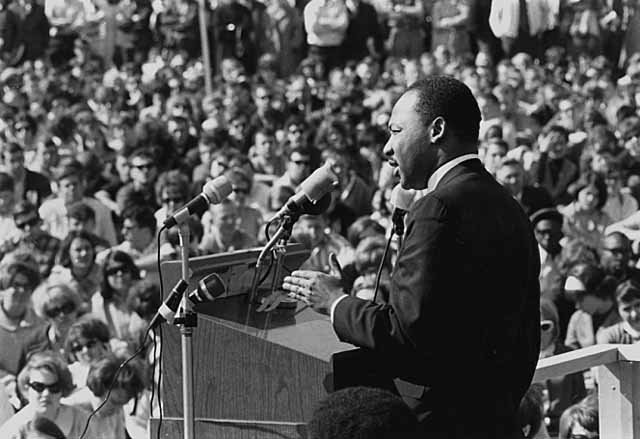Freedom Camp: A Teach-in on the Martin Luther King Jr. Holiday
Teaching Reflection by Katie Kissinger
Here is how one group of educators plans a day of activities for children ages 5-15+ to learn about the people, events, and songs of the Civil Rights Movement. In school settings, the activities outlined in this article can be modified to replace traditional assemblies, providing a more hands-on and interactive experience for students.
Martin Luther King, Jr., speaking against the Vietnam War, St. Paul Campus, University of Minnesota. Minnesota Historical Society
“Who can tell me whose birthday it is today?”
“Martin Luther King!” the children yell.
“What do you know about Dr. Martin Luther King Jr.?” I ask.
Lots of hands go up. One child says, “He made it so Black people could sit anywhere they want to on the bus.”
Another child adds, “He did lots of marches and speeches about his dreams.”
There are usually other ideas such as, “He wanted everyone to be equal,” “He worked so Black people could vote,” and “He made it so Black people could eat or live anywhere they want to.”
Then I tell the children and teenagers that Dr. Martin Luther King Jr. was one person who was part of the Civil Rights Movement, but a movement means lots and lots of people working together to make changes and to make things more equal or more fair. I ask them if they know anyone else who worked in the Civil Rights Movement. This time, just a couple of hands go up. Someone says, “Rosa Parks,” and a second child adds, “Malcolm X.”
I say, “Yes, those are two other people who worked to make things fairer.” Then, to bring focus to this opening group session at Freedom Camp, I remark, “We are here today to learn about more of the people who worked in the Civil Rights Movement and about some of the things they did to improve people’s lives. We’re also going to learn some of the songs they sang when they were doing this work. And we are here today to see if there are some things you can do to make the world a place where people are treated more fairly and equally.”
Planning for Freedom Camp begins each fall. Members of our local grassroots group, the Oregon Diversity Network, renew our decision to organize and implement this annual event, scheduled for Martin Luther King Jr. Day in January.
When we first decided to start Freedom Camp, we had several key goals:
To provide a meaningful, social justice-oriented event for children on the Martin Luther King Jr. holiday instead of just another day off from school;
To increase children’s understanding of the Civil Rights Movement as a mass effort, not just the work and success of one individual;
To promote children’s awareness and confidence that they, too, can work with others to change something that is unfair or unjust; and
To help children learn about the importance of music in this and other struggles for social change.
Each year as we review and plan Freedom Camp, these goals, and the ways to go about achieving them, become clearer and clearer. We also discover more about both the process and the outcomes of doing this work together.

